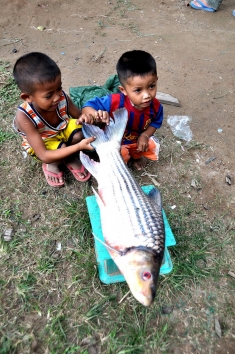PR - Mekong’s Future Remains Uncertain as MRC Reaches Stalemate Over Don Sahong Dam

Bangkok, Thailand: Regional cooperation was placed on hold yesterday, as Mekong River Commission (MRC) member countries reached a stalemate at a special session held over procedural deliberations regarding whether or not the Don Sahong Dam is required to undergo regional decision-making. According to a press release by the MRC, whilst Laos claims only notification is required for the project, Thailand, Cambodia and Vietnam have expressed concerns over the project’s transboundary impacts and have stated that the project should undergo the ‘prior consultation’ process, to allow for a regional decision over whether to build the dam. As the MRC’s Joint Committee was unable to reach an agreement, they elevated the decision to the ministerial level, in order to determine how to proceed with the proposal.
“This stalemate over the Don Sahong Dam illustrates the precarious state of future cooperation in the Mekong,” said Ms. Ame Trandem, Southeast Asia Program Director for International Rivers. “The 1995 Mekong Agreement requires each country to make a good faith effort to reach agreement in order to sustainably manage the Mekong River. Nevertheless, the spirit of the Agreement has been violated once again by Laos’ stubborn insistence on disregarding its neighbors concerns over the Don Sahong Dam.”
In September 2013, Laos announced to the MRC and neighboring countries its plan to build the Don Sahong Dam. By simply notifying neighboring countries of its intentions to build the Don Sahong Dam, Laos bypassed its responsibility under the 1995 Mekong Agreement to submit the project through the MRC’s ‘prior consultation’ process. As a result, Thailand, Cambodia and Vietnam each officially sent letters to the Lao government requesting that the project undergo prior consultation. International donors to the MRC, as well as the MRC Secretariat itself, have also advised that the project be subject to prior consultation.
“As yesterday’s special meeting was unable to resolve the procedural dispute between the four countries, the Don Sahong Dam risks facing the same fate as the Xayaburi Dam - where the ministerial level was tasked with solving the problem and then faced political gridlock as Laos repeatedly refused to allow discussions to advance,” said Ms. Pianporn Deetes, Thailand Campaign Coordinator for International Rivers. “Because the 1995 Mekong Agreement and its procedures are riddled with ambiguities and lack teeth, the Mekong River faces a dangerous trajectory, in which unilateral interests are hijacking regional cooperation and well-being.”
Due to problems that arose during the Xayaburi Dam’s prior consultation process, donors to the MRC issued a Joint Statement in January 2013 that called for “all ambiguities regarding the application of the PNPCA [prior consultation] be resolved before any further mainstream project proceeds.” Some of the problems included ambiguities over how to extend the consultation process, whether one country had the right to close the process, and how to ensure that concerns raised are adequately addressed.
At yesterday’s meeting, Thai, Cambodian and Vietnamese representatives voiced concerns over the Don Sahong Dam’s transboundary impacts to the river’s fisheries and the project’s unproven mitigation measures. The Don Sahong Dam is located less than 2 km away from the Cambodian border, on one of the most important channels in the Mekong River that allows for year-round fish migration. While international law requires a transboundary impact assessment for projects that pose significant harm on other countries, a transboundary impact assessment has not been carried out for the Don Sahong Dam.
During the meeting, Vietnam’s Joint Committee representative Dr. Le Duc Trung stated “We view that impacts on fisheries will be significant.” Cambodia’s Joint Committee representative Mr. Te Navuth added “We view that the project documents are incomplete and the studies do not cover transboundary issues in countries such as Cambodia. If the alternative routes (for fish migration) don’t function well, the dam will have impacts on food security and nutrition on Cambodia.”
“Laos must stop ignoring its regional responsibilities and begin cooperating in good faith. Rather than gamble with the Mekong’s fish, the MRC and its donors must take a hardline approach by demanding an immediate halt to any further construction and work towards the Don Sahong Dam and other mainstream projects,” continued Ms. Trandem. “The Mekong River does not belong to one country; it is a common resource and is vital for the food security of millions. Until the MRC can fix its governance problems or create a new platform for regional deliberations over the shared river, the future of the Mekong River is in dangerous hands.”
In April, the MRC will hold its Second MRC Summit, in which the four governments are expected to reaffirm their political commitment and address challenges faced in regional cooperation and the sustainable management of the Mekong River Basin. Should the MRC’s ministers fail to immediately resolve the issues that have arisen with the Don Sahong and Xayaburi dams, it’s unlikely the Summit will reach its objectives.Ame Trandem, Southeast Asia Program Director, International Rivers: +66 868 822 426, ame@internationalrivers.org


